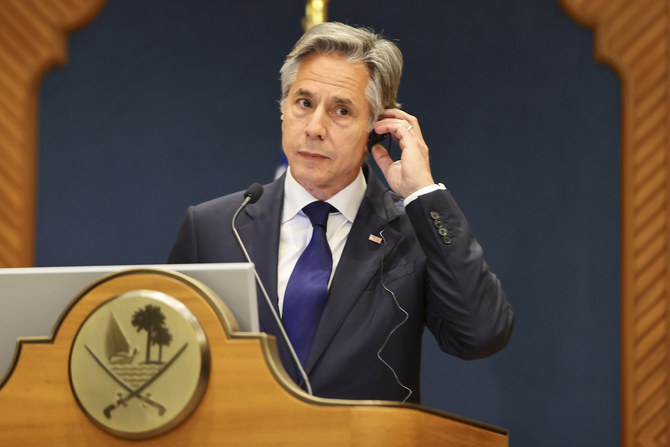DOHA: US Secretary of State Antony Blinken said on Wednesday that Hamas had proposed numerous changes, some unworkable, to a US-backed proposal for a ceasefire with Israel in Gaza, but that mediators were determined to close the gaps.
Senior Hamas official Osama Hamdan denied that the Palestinian group had put forward new ideas. Speaking to pan-Arab Al-Araby TV, he reiterated Hamas’ stance that it was Israel that was rejecting proposals and accused the US administration of going along with its close ally to “evade any commitment” to a blueprint for a permanent ceasefire in Gaza.
White House National Security Adviser Jake Sullivan said on Wednesday many of Hamas’ proposed changes were minor “and not unanticipated” while others differed more substantially from what was outlined in a UN Security Council resolution on Monday backing the plan put forward by US President Joe Biden.
Earlier on Wednesday, Izzat Al-Rishq, from Hamas’ political bureau based outside Gaza, said its formal response to the US proposal was “responsible, serious and positive” and “opens up a wide pathway” for an accord.
Hamas also wants written guarantees from the US on the ceasefire plan, two Egyptian security sources said.
Biden’s proposal envisages a truce and a phased release of Israeli hostages in Gaza in exchange for Palestinians jailed in Israel, ultimately leading to a permanent end to the war.
At a press conference with Qatar’s prime minister in Doha, Blinken said some of the counter-proposals from Hamas, which has ruled Gaza since 2007, had sought to amend terms that it had accepted in previous talks.
Months of talks
Negotiators from the US, Egypt and Qatar have tried for months to mediate a ceasefire in the conflict — which has killed tens of thousands of Palestinians and devastated the heavily populated enclave — and free the hostages, more than 100 of whom are believed to remain captive in Gaza.
“Hamas could have answered with a single word: Yes,” Blinken said. “Instead, Hamas waited nearly two weeks and then proposed more changes, a number of which go beyond positions that it had previously taken and accepted.”
The US has said Israel has accepted its proposal, but Israel has not publicly stated this.
Blinken said Washington would in coming weeks float ideas for a post-war Gaza administration and rebuilding of the enclave. “We have to have plans for the day after the conflict ends in Gaza, and we need to have them as soon as possible.”
Major powers are intensifying efforts to defuse the conflict in part to prevent it spiralling into a wider Middle East war, with a dangerous flashpoint being the escalating hostilities along the Lebanese-Israeli border.
Lebanon’s Hezbollah militia, backed by Iran, fired barrages of rockets at Israel on Wednesday in retaliation for the killing of a senior Hezbollah field commander. Israel said it had in turn attacked the launch sites from the air.
Taleb Abdallah, or Abu Taleb, was the most senior Hezbollah commander killed in the conflict, a security source said, and Hezbollah official Hashem Safieddine vowed that the group would expand its operations against Israel.
UN findings on war crimes
The fighting in Gaza began on Oct. 7 when militants led by Hamas burst across the border and killed 1,200 Israelis and took more than 250 hostage, according to Israeli tallies.
Israel’s air and ground war since then has killed more than 37,000 Palestinians, according to Gaza’s health ministry, displaced most of Gaza’s population of 2.3 million, caused widespread hunger and devastated housing and infrastructure.
A UN inquiry found that both Israel and Hamas had committed war crimes early in the Gaza war, and that Israel’s actions also constituted crimes against humanity because of the immense civilian losses.
The UN Commission of Inquiry (COI) produced two parallel reports, one focusing on the Oct. 7 attacks and another on Israel’s response.
Israel, which did not cooperate, dismissed the findings as the result of anti-Israeli bias. Hamas did not immediately comment.
The reports released in Geneva, which cover the period to December, found both sides had committed war crimes including torture; murder or wilful killing; outrages upon personal dignity; and inhuman or cruel treatment.
Evidence gathered by such UN-mandated bodies can form the basis for war crimes prosecutions.
It could be drawn on by the International Criminal Court, where prosecutors last month requested arrest warrants for Israeli Prime Minister Benjamin Netanyahu, his defense minister and three Hamas leaders for alleged war crimes.
Israel continues assaults in Gaza
As diplomats sought a ceasefire deal, Israel continued assaults in central and southern Gaza that are among the bloodiest of the war.
Netanyahu has repeatedly said Israel will not commit to end its campaign before Hamas is eliminated.
Residents said Israeli forces had pounded areas across Gaza on Wednesday as tanks advanced toward the northern part of the city of Rafah, which skirts the Egyptian border.
Palestinian health officials said six people had been killed in an airstrike on Gaza City in the north, and one man had been killed by a tank shell in Rafah.
Footage circulated on social media from Rafah’s “Saudi” neighborhood, which Reuters had not verified, showed swathes of destruction after tanks retreated.
In the central city of Deir Al-Balah, mother-of-two Huda said the displaced had lost hope that the war would end anytime soon. “We lost faith both in our leaders, and in the world,” she told Reuters via a chat app.
“Ceasefire promises by our leaders and the world are like words written in butter at night, they disappear with the first light of day.”



























